 I am back in the taxi driving north to a center in the middle of Gaza, Al Zahraa. They are housed in a snazzy new building that is still under construction. We walk through an elegant entrance with a sandy floor and piles of construction material into an upscale center and meet with Zeanab Fayez Joudah who explains they moved in February 2016 after many struggles awaiting project approvals and funds. The center provides vocational training for the middle areas of Gaza and works with other women’s and human rights groups.
I am back in the taxi driving north to a center in the middle of Gaza, Al Zahraa. They are housed in a snazzy new building that is still under construction. We walk through an elegant entrance with a sandy floor and piles of construction material into an upscale center and meet with Zeanab Fayez Joudah who explains they moved in February 2016 after many struggles awaiting project approvals and funds. The center provides vocational training for the middle areas of Gaza and works with other women’s and human rights groups.
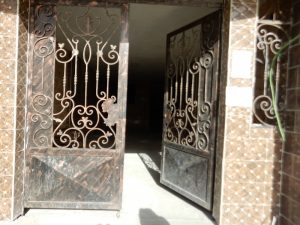
They have a three month training program with 40-50 women to learn beauty and cosmetics, ceramics, mosaics, knitting, and embroidery. Funding is a major concern.
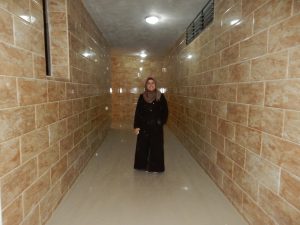
Four women join us in the office, they are concerned about asking female questions in front of my translator who is single (translation, virgin, unfamiliar and uncomfortable with the functions of the female body). I assure them that she has already had quite an education translating for me and there is a bit of blushing and giggling. So we dive in with the first woman asking a lengthy question about her missing periods. I think there is something lost in translation as she has had five successful pregnancies and now has an IUD, mostly she wants to be reassured that she is healthy.
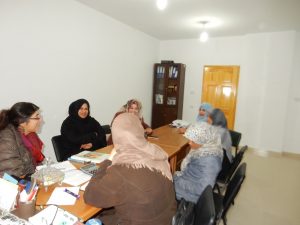
The next lady complains of pains and infections in her ovary “like a headache.” She is unmarried (translation: officially virginal) and suffers from right sided pain relieved by Trofin 600. For me the main clue is that she was in Shejaia in 2014 and is probably suffering from the trauma of that horrific attack. I can assure her that her ovaries are probably fine but I am unclear which of her symptoms are physical and what is stress related. Women worry about medications they took in pregnancy, one child has a streak of white hair. Did the mother do something wrong? They want to know if too many pregnancies make a woman weak and that gives me an opportunity to provide some basic education about anemia, nutrition, and spacing of pregnancies.
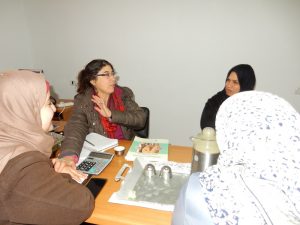
The last time I was here, the women in the vocational unit offered to do my hair and makeup and I plopped myself in a chair for an hour of cross cultural personal improvement, laughter, and sisterly exchange. They are unhappy that I do not have time for a makeover on this visit, (I think they see me as a benighted western woman much in need of cosmetic improvement), “at least let me do your eyebrows.”
After the formal session, I chat with several women, all presenting very conservatively wearing hijabs and long coats. One women excitedly wants to show me her engagement pictures. Soon we are peering at photos on her phone; she is dressed in a slinky low cut red dress, her hair coiffed, movie star style, with a heavy dose of kohl and exquisitely shaped eyebrows. Her facial expressions remind me of a seductive actress, a femme fatale draped over her man, the only man surrounded by similarly dressed sultry women in miniskirts and longer, tight-fitting, sexy dresses.
I marvel at these conflicting cultural messages: the expectation that women will present very modestly in public, guard their precious virginity; the contrasting seductive women’s parties, the fierce strength that is required for women to demand their rights and their liberation in a conservative society. How does women’s liberation and empowerment look in Gaza? How has it been crushed by siege and war? Are women trapped in contradictory messages or comfortable with the safety of covering up in public and the freedom to let go in private? Is the seductiveness of women seen as a danger or as a desirable part of being female to the men all around them? So many unanswered complicated questions.
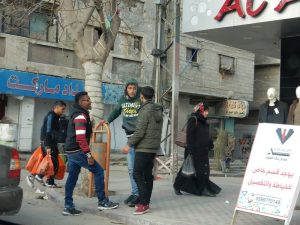 Soon I return to the taxi driving north, back to Marna House to meet with an administrator from the Gaza Community Health Program to plan several articles on the conditions in the Strip, to try to document the medical, mental health, and human rights costs of the siege and repeated assaults.
Soon I return to the taxi driving north, back to Marna House to meet with an administrator from the Gaza Community Health Program to plan several articles on the conditions in the Strip, to try to document the medical, mental health, and human rights costs of the siege and repeated assaults.
For more information, see 2015 blog https://alicerothchild.com/2015/03/march-28-2015-sisterhood-is-still-powerful/